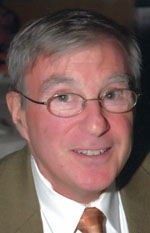First the Jews: Combating the World’s Longest-Running Hate Campaign by Rabbi Evan Moffic, Abingdon Press, Nashville © 2019, ISBN 978-1-5018-7083-5, p. 228 plus notes, $22.
By Fred Reiss, Ed.D.

WINCHESTER, California – Singer-songwriter Bob Dylan assured us we “Don’t need a weatherman to know which way the wind is blowing.” In the same vein, we don’t need polls informing us that anti-Semitism and hate crimes are on the rise, the daily news is our guide. But why, and why now? Author Evan Moffic, spiritual leader of Reform Congregation Solel in Highland Park, Illinois, addresses these questions in First the Jews while describing his metamorphosis from naïve witness to committed teacher of all faiths about the poison fruits of hate.
The present generation, both Jews and non-Jews, he believes, is so far removed from the Nazi atrocities of World War II that the State of Israel, which is now both technologically and militarily powerful, is perceived as an aggressor-nation, rather than a safe harbor and a land of protection rising out of the ashes of the Holocaust.
Moffic asserts the present-day alt-right, what he calls the “new” alt-right, differs from the alt-right of Jerry Falwell’s era of the 1970s, in that the new alt-right’s anti-Semitism is based on the Jew as the enemy-from-within, controlling such things as foreign policy, Wall Street, and Hollywood, rather that Christ killer. Current anti-Semitism “resembles the perspective of Hitler more than, say, the view of Jews held by a Christian theologian such as Martin Luther.”
Optimism gave way to realism in 2017, when, on a return trip to Houston, he sees his old Jewish community center surrounded by a cast-iron fence. “Times had changed,” he recalls, “and the iron fence represented that change.” Moffic, struggling over how Jews should respond to the changing climate—perhaps inwardly, hiding behind walls and withdrawing to vigilance and tribalism, or maybe outwardly, by openly expressing Judaism to our non-Jewish neighbors—reviews the story of anti-Semitism beginning with Western Civilization’s “first anti-Semite,” the third century BCE priest Manetho, who, in contrast to the Hebrew Bible, casts the Jewish slaves as reprobates and lepers. He continues with the history of Christian anti-Semitism, including its theology, the Crusades, and Martin Luther and the Protestant Reformation.
For Moffic, it is an oxymoron to trust that we live in a Judeo-Christian country. Christianity rejects the basis of Jewish ritual: circumcision and Jewish dietary laws, and in replacing Judaism, sought to prove “the backwardness and severity of Judaism itself.” Moffic argues that merely substituting “Jewish law” with “Christian love” does not constitute anti-Semitism. “What is anti-Semitic, however, is suggesting that Jewish commitment to law is at odds with the ethic of love.”
The greedy and deceptive Jew, as portrayed in the Christian Bible, is both a powerful and effective source of anti-Semitism through the ages, raising its ugly head into modern times, as evidenced by the Holocaust and movements calling themselves anti-Israel, but revealed to be anti-Jewish.
Islamic hatred of Jews has its roots in the Hebrew Bible through the story of Hagar and Ishmael, Sarah’s handmaiden and her son, fathered by Abraham. But, just as with Martin Luther centuries later, anti-Jewish feelings flared only when Jews rejected Muhammad’s demand for conversion, leading to tenuous and strained relationships within Muslim communities during Islamic rule. Moffic explains how Christian missionaries reignited these anti-Jewish feelings with the rise of European imperialism in the Muslim world during the nineteenth century.
To combat Islamic anti-Semitism, he suggests for instance, recognizing that Islamophobia and anti-Semitism are two sides of the same coin. “Calling out Islamophobia may not change the minds of extremists, but it builds alliances with moderate and progressive Muslims.”
Ambivalence and tension among Jews and their neighbors pervade the book, “Relations between Jews and Christians have never been better [yet,] in America, more Jews are victims of hate crimes than any other single group.” What can be done, asks Moffic, about a disease that can not and will not ever be prevented or cured? Looking to the Hebrew Bible to find answers, he offers such conclusions as respecting the diversity of opinions, having a healthy suspicion of leaders and ideologies, and increasing and supporting communal linkages.
The votes and actions of the United Nation demonstrate that anti-Semitism is part and parcel of the world’s DNA: An alien in a spacecraft hovering over the Earth and monitoring its communications could reasonably conclude that all the woeful problems of humanity fall squarely on the shoulders of the Jewish people. With their elimination, racial bigotry ends, religious hatred is no more, social and economic justice prevails, war ceases. Of course, this is nonsense.
First the Jews is an excellent example of easy-to read scholarship that places into perspective the sad tale of Western Civilization’s unwarranted disdain and disrespect for a group of people so few in number, smaller than a small statistical error in the Chinese census.
*
Dr. Fred Reiss is a retired public and Hebrew school teacher and administrator. He is the author of The Comprehensive Jewish and Civil Calendars: 2001 to 2240; The Jewish Calendar: History and Inner Workings, Second Edition; and Sepher Yetzirah: The Book That Started Kabbalah, Revised Edition. The author may be contacted via fred.reiss@sdjewishworld.com.